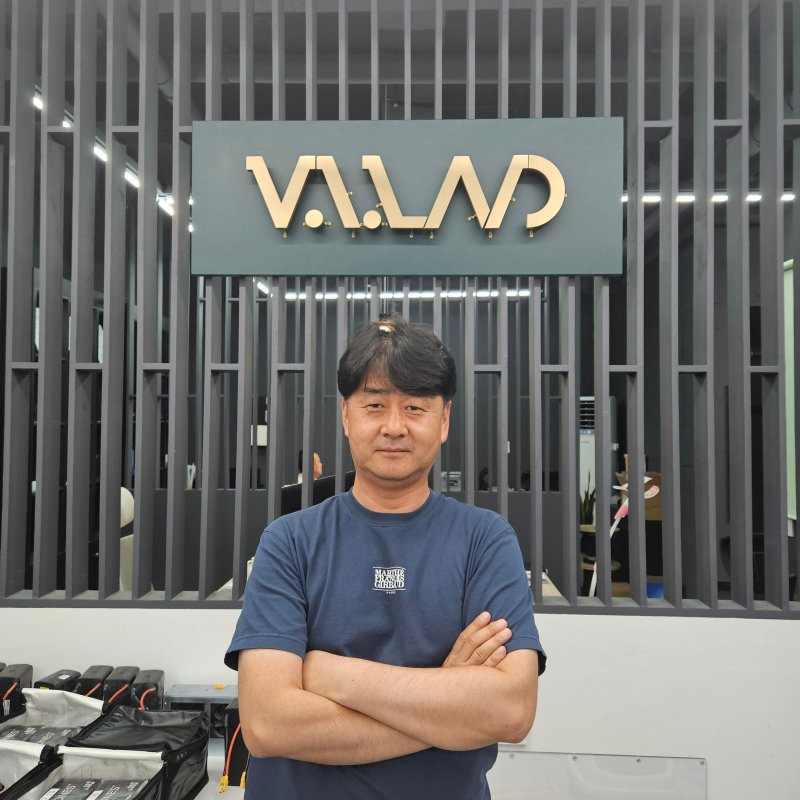“Korean Drone Components Set for U.S. Export—VOLOLAND Challenges Global Market as a Game-Changer”
By Ji-yoon Seo, Financial News | July 13, 2025, 18:26 KST
Ahn Sungho, CEO of Vololand
-
Holds Korea’s only patent for flight data self-destruction
-
Developed triple-redundancy flight control system
-
“Pushing R&D for defense, education, and agricultural drones”
“With U.S. companies now scrambling for alternatives due to restrictions on Chinese drone parts, the opportunity has come for Korean components,” said Ahn Sungho, CEO of VOLOLAND, in an interview on the 13th. “We plan to begin full-scale exports of drone parts to the U.S. starting this year.”
Founded in 2021, Vololand is a startup specializing in the development and manufacturing of core drone components, systems, and stations. It holds the only domestic patent for flight data self-destruction technology and is the sole company in Korea with a triple-redundant flight controller system.
Although drones have emerged as game-changers in defense, public safety, and agriculture, the market has long been dominated by inexpensive Chinese parts, making it difficult for Korean firms to compete. However, the Korean government’s recent push for domestic component localization and the U.S. government’s sanctions on Chinese parts are turning the tide.
“Chinese parts quickly took over the market due to their low cost relative to performance,” said Ahn, “but now that Korea has launched a national initiative for domestic production and the U.S. military has banned Chinese drones for security reasons, more companies are showing interest in Vololand.”
Ahn, who studied UAV engineering and computer science, is considered a leading authority in the drone sector. He has led 13 national drone research projects and spearheaded Korea’s first full-scale drone station demonstration project.
Based on his extensive experience, Ahn developed two critical drone components in-house: the flight controller (FC) and an AI edge computer. Last year, Vololand conducted over 1,000 test flights using drones composed of over 80% domestically produced parts. The company was subsequently named Top Demonstration Company in the Ministry of Land, Infrastructure and Transport’s drone delivery pilot program.
“We’ll continue advancing our existing solutions while also expanding into new business areas,” Ahn said. “This year, we’ve launched R&D on small FPV drones for defense and education, as well as agricultural drones.”
This philosophy—to challenge with technology and compete with products—is at the heart of Vololand’s identity.
In addition to components, Vololand has also developed drone stations for storage and charging. According to Ahn, these stations automate data transmission, flight plan updates, and drone condition checks, enhancing operational efficiency.
The drone industry continues to grow steadily. With Korea’s Ministry of National Defense planning to deploy 100,000 FPV drones starting this year, the related market is expected to exceed ₩60 billion KRW (approx. $45 million USD) annually.
In line with this, Vololand is currently in talks with U.S. partners to export its military-grade “Narin FC” model. The Narin FC has already secured three domestic patents and completed PCT international patent filings.
“It’s tough to sell even 100 units domestically, but in the U.S., a single buyer may order 2,000 to 3,000 units,” Ahn noted. “We plan to launch with a new entity in Georgia, U.S., and then expand into Canada, Europe, and the Middle East.”
stand@fnnews.com | Ji-yoon Seo

